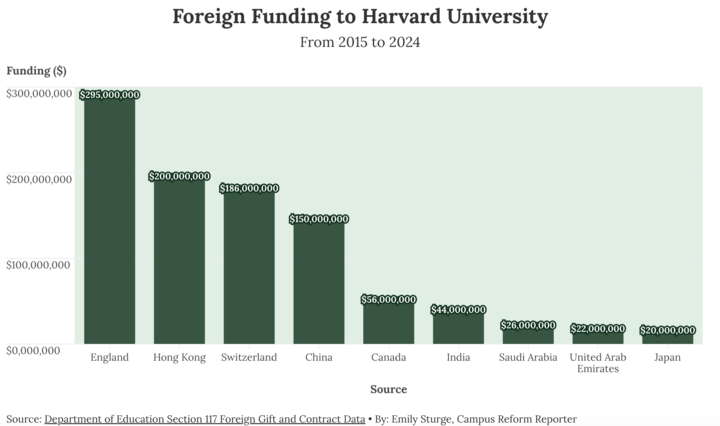Harvard accepted over $1.4B from foreign sources, Campus Reform audit finds
Campus Reform obtained data from the Dept. of Education and found that Harvard accepted more than $295 million from England, $200 million from Hong Kong, and $150 million from China, raising concerns of foreign influence.
Harvard University received over $1.4 billion in funding from 77 foreign countries over the last 10 years, according to an audit conducted by Campus Reform.
Campus Reform obtained data from the Department of Education to analyze Harvard’s sources and amounts of foreign funding, including contracts, gifts, and grants received from 2015 to 2024. These figures were retrieved from contributions with receipts dating back to January 2015.
Campus Reform found that Harvard received more than $295 million from England, $200 million from Hong Kong, and $150 million from China, raising concerns of foreign influence.
The Department of Education’s data lists “England” and not the United Kingdom.

Harvard is facing a federal funding showdown with the White House, calling into question both federal and foreign funding to America’s wealthiest university.
Per an April 17 letter sent to Harvard, the Department of Education is requiring the university turn over records of foreign funding, alleging it has failed to disclose donations from foreign sources.
This letter follows the Trump administration’s recent freeze of $2.2 billion to Harvard after its refusal to comply with a list of the administration’s directives, including disclosing foreign funding.
President Trump signed an April 23 executive order titled ”Transparency Regarding Foreign Influence at American Universities” which will “require complete and timely disclosure by higher education institutions of foreign funding.”
Section 117 of the Higher Education Act requires American universities that receive federal funding to disclose any gifts and contracts from foreign entities that exceed $250,000 to the Department of Education.
President Trump’s executive order claims that the Department of Education has failed to uphold Section 117 and “the true amounts, sources, and purposes of foreign money flowing to American campuses are unknown.”
Harvard, a private institution, has an endowment of $53.2 billion and receives more than $9 billion in federal funds.
The Trump administration’s multi-billion-dollar federal funding freeze comes alongside the IRS weighing revoking the institution’s tax-exempt status.
In an April 11 letter to Harvard President Alan Garber, the Trump administration discussed the needs for Harvard to “disclose the source and purpose of all foreign funds” and “cooperate with the federal government in a forensic audit of foreign funding sources and uses.”
This concession is one of the many that Harvard has rejected and says the institution will not comply with, resulting in the funding freeze.
“No government—regardless of which party is in power—should dictate what private universities can teach, whom they can admit and hire, and which areas of study and inquiry they can pursue,” Harvard University quoted President Alan Garber on X.
Despite Harvard’s statement against government influence within private universities, the university collected more than $2 billion in funding from foreign governments, raising concerns about possible foreign influence.
Republican lawmakers have suggested foreign influence from the Chinese Communist Party (CCP) at Harvard.
Chairman John Moolenaar (R-Mich.) of the House Select Committee on the CCP expressed his concerns of Chinese foreign influence as a national security threat at American universities, calling for increased transparency.
The data shows Harvard accepted over $150 million in gifts and contracts from China since 2015, giving weight to these concerns.
Campus Reform previously reported the arrest and sentencing of Harvard’s former Chemistry Department Chair Charles M. Lieber after he lied to the federal government about receiving payment from the Chinese government to work for Wuhan University of Technology during the COVID-19 pandemic.
Lieber participated in a Chinese government program to recruit global scientists and accepted over $1.5 million in funds from the CCP.
More recently, Campus Reform reported Michigan State Rep. Will Bruck’s (R) bill that would “prohibit state institutions of higher education from receiving grants and other items of value from foreign actors under certain circumstances.”
The proposed legislation would “establish reporting requirements” for universities accepting gifts from sources like China, bringing greater transparency.
Campus Reform has contacted Harvard University for comment. This article will be updated accordingly.

